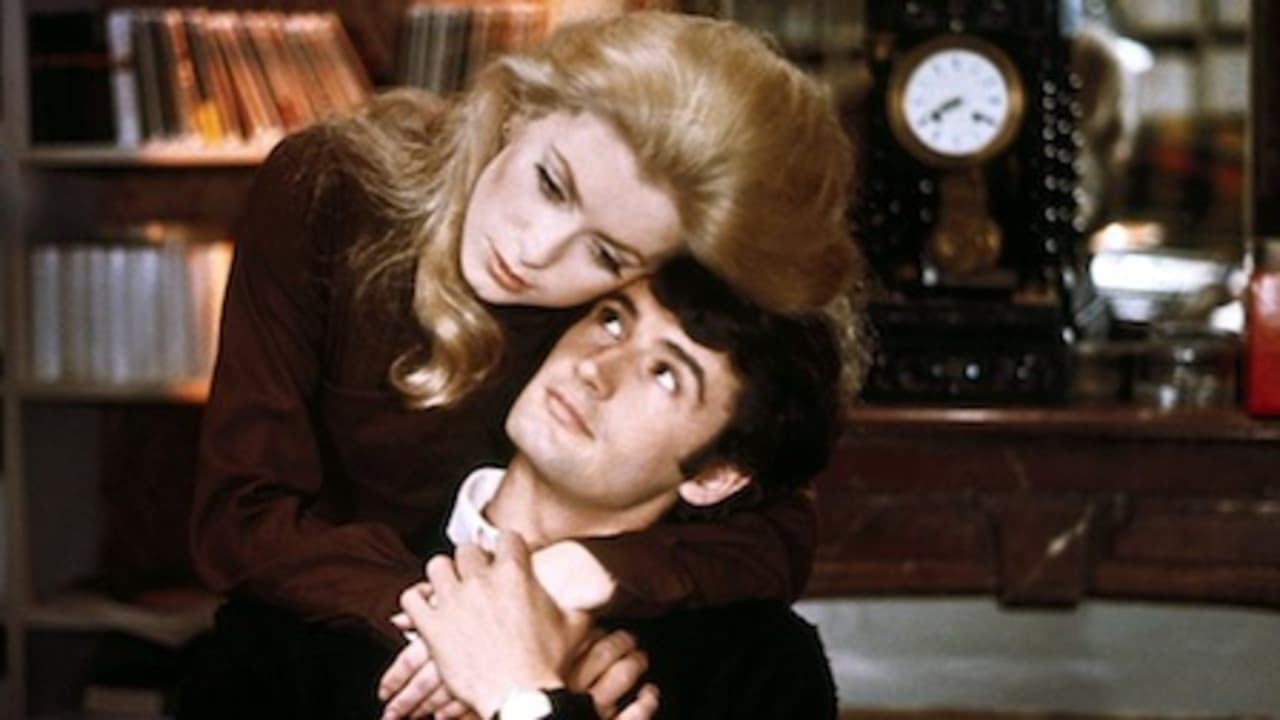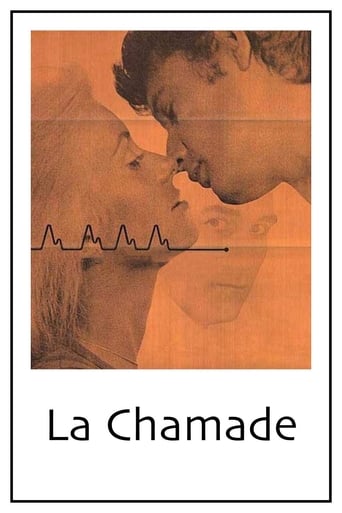

I will admit it up front that I am old fashioned. I believe in monogamy and many old fashioned values. So, when I see a film like "La Chamade", I have a great difficulty enjoying it. After all, the folks in this film seem awfully amoral and selfish. So why should I care about them and their petty problems?! The film begins with Lucile (Catherine Deneuve) being Charles' (Michel Piccoli) mistress. She lives well, as Charles is rich and indulgent--he obviously loves her. However, when she meets Antoine (Roger Van Hool), she falls for him and decides to keep both men as her lovers. But, Antoine is the jealous sort and after leaving his wife, he insists that Lucile leave Charles--which she eventually does. However, now that she no longer has all of Charles' money, she needs to work-and work is not for pretty people like her. So, she sells off all her jewels and just lounges about doing whatever she wants. Eventually, she becomes pregnant and bored with Antoine. So, she gets an abortion and returns to Charles. And, considering how nice Charles has been about all this, you wonder why he wants her back (apart from all their hot sex).When I write all this about the plot, I realize exactly why I disliked the film--the main character, Lucile, is morally bankrupt. She doesn't like to work, mistakes sex for love and just seems very shallow and self-absorbed. So why should I care about her and her petty problems? I dunno. It's a shame, as this IS a beautiful film--nicely filmed and the actors were quite food. But when the story involves people you cannot relate to and seem so selfish, you aren't left with much.
... View MoreMark Twain once said that anyone who picked a cat up by the tail learns never to pick a cat up by the tail again. In this film, no one picks the cat up by the tail, therefore no one seems to learn much. It is painful to see an actress of Deneuve's quality going from scene to scene without intensity. Most the time she is either walking, walking, walking or drinking, drinking, drinking. To me, she is simply unconvincing as lover in this film. Except for the first few scenes, one feels one is looking through a photo album haplessly put together. There seems to be very little passion in Lucille falling out of love for Charles, into love for Antione, and out of love for Antione. Consider this: Perhaps the film is a victim of the times. The intellectualism of the Beatniks of the 1950s and the rebellion of the hippies of the early 1960s was morphing into the leisure suits of the 1970s. And the logic of the film seems askew. Can an expensively kept partner of a very wealthy member of the upper class find love and happiness with a poor immature writer living in a one-room apartment in the projects? It all seems too unlikely. All film fans have to suspend a certain amount of disbelief, but you'd have to live on another planet to accept the plot of this film. I can't recommend this movie.
... View MoreFor three years, the beautiful Lucile has lived with wealthy Paris businessman Charles, for whom she is a lovely ornament,and an admired figure among their rich, leisured circle. Lucile lives for pure sensation; the best clothes (all by Yves St Laurent), chic restaurants, summers in St Tropez. Her hedonistic character is symbolised by her pleasure in putting her head or hands out the window of her sports car and enjoying the rush of cool air. After a theatre party, she's attracted to Antoine, young journalist lover of a woman in the group. Charles throws them together, gambling a brief fling will get it out of her system. But their affair becomes more serious, and common knowledge after the two argue at a formal soiree. Following this key scene, with the disapproving guests ranged silently against the couple like a tribunal that find them guilty of that most despicable of social crimes, Bad Taste, Lucile leaves Charles's mansion for Antoine's cluttered apartment. Her new life is a shock. She has to take buses, and even work for a living,hauling files in a newspaper research library. She sells her jewels,and flirts with the idea of selling herself to a wealthy American who tries to pick her up. Her resentment of her new condition is summed up in a section of William Faulkner's SANCTUARY in which the writer unashamedly endorses a life lived for pleasure alone. She reads the passage aloud to a cafe crowded with civil servants glumly eating their lunch, and they erupt in applause.When Lucile gets pregnant, it's Charles to whom she turns for the abortion. As the relationship with Antoine deteriorates, she ducks the grim modern play he wants her to see, and instead accompanies Charles to a concert. Dressed again in one of her St Laurent gowns (she's left fifty of them at Charles's place, perhaps suspecting she might need them again) and sipping champagne while listening to Mozart, she realises this is her true milieu. Next morning, she returns to the sleeping Antoine only to set out a single coffee cup for his breakfast, then ring him from the bar downstairs with news that it's over.Few actresses convey sensuality more effectively than Deneuve, and in LA CHAMADE she's at her most seductive. She exudes undiluted desire when,beautifully sun-tanned, she welcomes the news that Antoine will join her in St Tropez for a mid-summer idyll. The phone call comes at a bar telephone next to the statue of a bare-breasted woman - as close as the film ever gets to nudity. Throughout, Deneuve never shows more than a leg and her shoulders. Yet even a scene where she dumps salt and hot water into a red plastic bowl to soak her sore feet carries an erotic tingle.While Lucile is no heroine, she's the archetypal Parisienne, her self-regard justified by her beauty and style. Ironically, LA CHAMADE was made on the eve of the 1968 revolutionary "events", as the French now call them. At the time, the disappearance of Lucile and her class was confidently predicted. Like similar forecasts in 1789, it was premature. Today, Paris is more and more filled with such beautiful creatures, and Deneuve herself continues to flourish. Vive la France, and Vive la Deneuve!
... View MoreSlick but rather tedious romantic melodrama from a novel by Francoise Sagan, despite the presence of two of European cinema's most representative - and durable - actors in Catherine Deneuve and Michel Piccoli (who've been teamed a staggering 16 times throughout the years but their best moment, surely, was in Luis Bunuel's sublime BELLE DE JOUR [1967]).With a plot that's too thin - and familiar - to sustain its length, the film depends entirely on its two stars: Piccoli, however, has played this role far too often (including THE GAME IS OVER [1966] which preceded it; see review above) but Deneuve - at the height of her beauty - is as captivating as ever. Still, Roger Van Hool is vapid as Deneuve's young lover - which rather prevents audience involvement in the couple's plight!
... View More